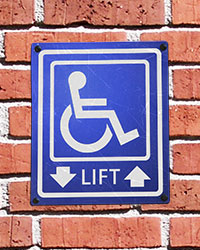 Scenario
Scenario
Robert first visited the Disability Services Office (DSO) when he toured the campus with his Grade 12 class. He arrived at the DSO in his motorized wheelchair and wanted to know what services and supports would be available to him if he enrolled at the university. The DSO staff welcomed him with enthusiasm, but inwardly worried how someone with such limited gross and fine motor skills would actually survive on the busy campus. Robert impressed them at the very first meeting with his tenacity and drive. He was articulate and clear about what he wanted to do.
Preparations for Robert’s arrival began almost immediately. The first concerns were about making sure his classes and his residence were accessible. Once Robert was registered and had selected his classes, the DSO staff worked with on-campus housing and the registrar to make sure that Robert was placed in an accessible residence room and that he could be physically accommodated in each of the classrooms. Two classes had to be changed to buildings with entrance access ramps and elevators. His social worker helped with his Canada Study Grant application, as Robert needed funding for attendant care services to help him with his daily personal care of bathing and dressing. The occupational therapist took a look at his residence room and made recommendations for adjustments to reduce the number of barriers. Despite being labeled as an “accessible” room, it quickly became evident that the room did not have features that easily accommodated someone who used a power wheelchair. (It’s not easy to prepare a meal when the kitchen cupboards are well above your head and you can’t reach them!)
Finally, September arrived and Robert got situated in his residence and started attending classes. Robert quickly learned that the pathways and crosswalks were not all safe on campus. There were many places where there were no curb cuts, which resulted in him having to bump onto the crosswalk. He was especially concerned about having to motor his wheelchair down a steep hill with no sidewalk in order to get to the dining hall. These issues were brought to the attention of facilities management and they made the repairs as quickly as possible before the cold and snow came. However, Robert had to traverse the campus daily in unsafe conditions until the work was completed.
Academically, Robert also faced obstacles. He was dependent on receiving class notes from a volunteer note taker. Some professors were really good at helping find a volunteer to take notes for him, while in other classes it was weeks before he started getting copies of notes. Robert had to deal with frustrations that most people wouldn’t think about. Robert was making progress, but it was a tough transition from high school to university life. There were so many academic and environmental challenges that he had never imagined he would have to face.
Finally, the school year ended with Robert passing most of his courses. Robert’s experience showed that someone with significant physical disabilities can be successful when there is the will to make it happen.